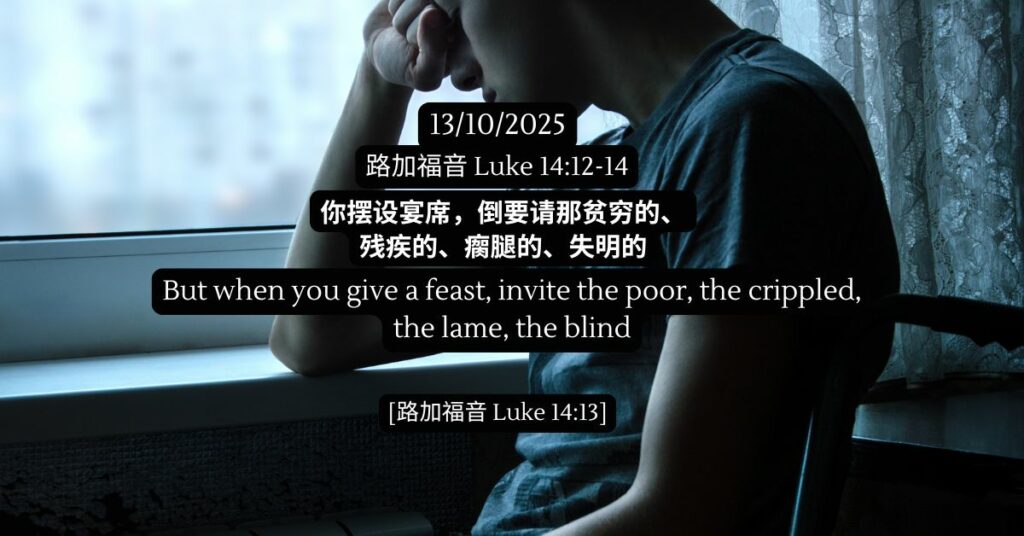Luke 14:12-14
But when you give a feast, invite the poor, the crippled, the lame, the blind – Luke 14:13
Click to read
At the banquet, Jesus reminded the host not to invite only those who could repay the favour (like family, friends, or wealthy neighbours), but to invite the poor, the crippled, the lame, and the blind. His words challenged the deeply ingrained social practice of reciprocity: “You invite me, I invite you.” Jesus sought to overturn this transactional way of relating and instead called His followers to love those who could never repay them.
In the kingdom of God, a true banquet is not a platform for building status or exchanging benefits. It is a place where God’s grace is revealed. God’s love is never transactional; it is freely given. Through this parable, Jesus showed that those whom God invites are often the very ones the world deems unworthy, overlooked, or forgotten. He calls us to welcome them, for we too were once the spiritually poor. Though we have nothing to offer in return, God graciously invites us to His table.
This reminds us that the Church is not a gathering of people who are “alike” or “equal in status,” but God’s household for the isolated, the marginalised, and the broken. If we only associate with those who are similar to us, we miss the most beautiful and transformative part of the gospel, a love that neither discriminates nor demands repayment.
Today, the Church must learn the heart of hospitality. To welcome is good, but to receive others is better. To receive means making space, sharing resources, and opening our hearts. It may mean befriending a lonely senior, a migrant worker, or a struggling believer who has lost his way. Each of them is an honoured guest at God’s banquet.
When we love those who cannot repay us, we reflect the very image of God, His merciful, self-giving, and boundless love. Such love may not earn applause in this world, but it is remembered by God in heaven. Jesus said, “You will be repaid at the resurrection of the righteous” (Luke 14:14). That eternal reward is the joy of sitting at the table with Christ Himself.
Reflection:
Are you willing to step out of your familiar circle to love those who are marginalised or overlooked? How can you practice a “non-transactional” kind of love in your daily life, inviting and blessing those who cannot repay you?
Prayer:
Merciful Lord, thank You for Your grace that welcomes the undeserving, allowing me to sit at Your table. Give me a compassionate heart to notice those around me who are forgotten or rejected. Teach me to receive them with Your love, not seeking reward, but seeking only Your glory. May our church be a home that welcomes all people, displaying the richness and grace of Your kingdom. In Jesus’ name I pray, Amen.
Click to read
At the banquet, Jesus reminded the host not to invite only those who could repay the favour (like family, friends, or wealthy neighbours), but to invite the poor, the crippled, the lame, and the blind. His words challenged the deeply ingrained social practice of reciprocity: “You invite me, I invite you.” Jesus sought to overturn this transactional way of relating and instead called His followers to love those who could never repay them.
In the kingdom of God, a true banquet is not a platform for building status or exchanging benefits. It is a place where God’s grace is revealed. God’s love is never transactional; it is freely given. Through this parable, Jesus showed that those whom God invites are often the very ones the world deems unworthy, overlooked, or forgotten. He calls us to welcome them, for we too were once the spiritually poor. Though we have nothing to offer in return, God graciously invites us to His table.
This reminds us that the Church is not a gathering of people who are “alike” or “equal in status,” but God’s household for the isolated, the marginalised, and the broken. If we only associate with those who are similar to us, we miss the most beautiful and transformative part of the gospel, a love that neither discriminates nor demands repayment.
Today, the Church must learn the heart of hospitality. To welcome is good, but to receive others is better. To receive means making space, sharing resources, and opening our hearts. It may mean befriending a lonely senior, a migrant worker, or a struggling believer who has lost his way. Each of them is an honoured guest at God’s banquet.
When we love those who cannot repay us, we reflect the very image of God, His merciful, self-giving, and boundless love. Such love may not earn applause in this world, but it is remembered by God in heaven. Jesus said, “You will be repaid at the resurrection of the righteous” (Luke 14:14). That eternal reward is the joy of sitting at the table with Christ Himself.
Reflection:
Are you willing to step out of your familiar circle to love those who are marginalised or overlooked? How can you practice a “non-transactional” kind of love in your daily life, inviting and blessing those who cannot repay you?
Prayer:
Merciful Lord, thank You for Your grace that welcomes the undeserving, allowing me to sit at Your table. Give me a compassionate heart to notice those around me who are forgotten or rejected. Teach me to receive them with Your love, not seeking reward, but seeking only Your glory. May our church be a home that welcomes all people, displaying the richness and grace of Your kingdom. In Jesus’ name I pray, Amen.

